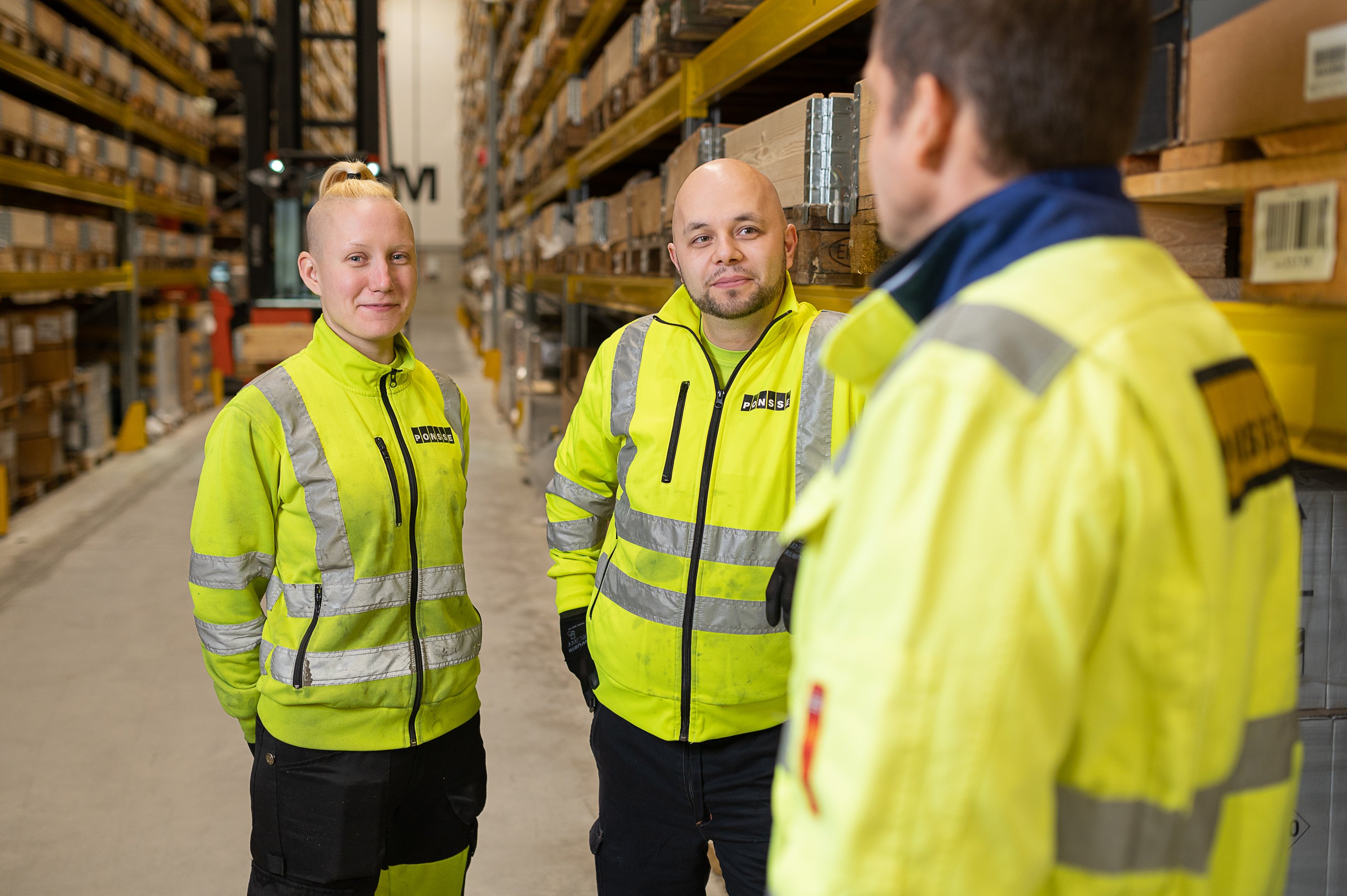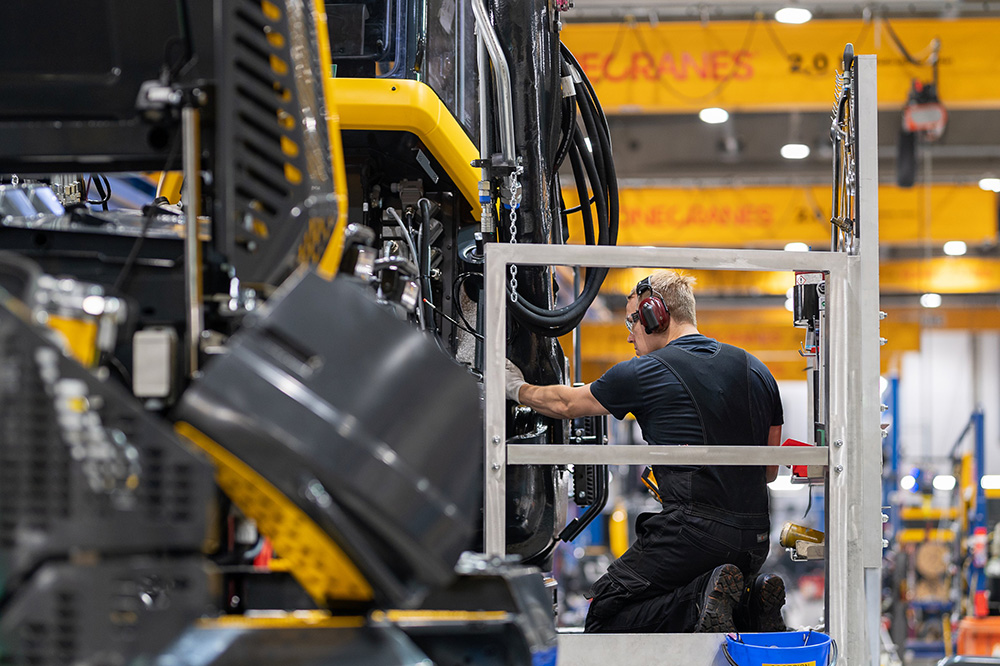- Knowing our environmental impacts and working systematically to reduce them
- Carbon neutral operations and solutions
At Ponsse, the carbon neutrality target means that we strive towards zero emissions from our products and operations through our own operations and product development. We will review the need and role of carbon offsetting as our climate programme progresses. Our emissions reduction targets cover our Scope 1 and 2 emissions (own operations and purchased energy).
The majority of our carbon footprint is produced by vehicle use (63% in 2023), followed by purchased heating (8% in 2023) and the fuel consumption of our work equipment and forest machine test drives (13% in 2023). Geographically speaking, the highest emissions in 2023 were generated by our operations in North Europe (46%), North America (23%) and South America (20%)
We will also define which Scope 3 emissions are relevant for our operations (product end use, component procurement, etc.). We aim to include Scope 3 emissions in our calculations at the beginning of 2024. We are collecting information from 2023 for our first value chain (Scope 3) emission calculation. We have identified key emissions categories in our operations and defined data collection and reporting policies for them. T

Key goals of procurement include the efficient circulation of stocks and the optimal availability of materials. This helps us keep our stock levels and needs for facilities and resources moderate and avoid material waste. The most significant environmental impact of our procurement and logistics is associated with steel manufacturing for PONSSE forest machines and the transport of components. Steel and castings combined make up a significant part (82%) of the weight of forest machines. We calculate and dimension machine structures in our research and development operations by optimising the use of steel and castings based on product loads. Forest machines have a recycling rate of 97%.
We have kept our environmental impact and other procurement risks under management by centralising our procurement in Europe and especially in Finland. Of Ponsse’s material suppliers and subcontractors, 73% are located in Finland (2022: 74%) and 24% in other EU states(2022: 23%). Ponsse exercises no significant direct sourcing from low-cost countries. In addition to Finland, the most technologically challenging and expensive components for PONSSE forest machines are sourced from Germany and Sweden.
Environmental impact of transport
A total of 47% of our subcontracted purchases (EUR) and 21% of all our procurement (subcontracting and purchased components) take place within a 25-kilometre radius from our production. Our subcontractors are mainly based in the partnership business park located in the immediate vicinity of our factory in Vieremä. This significantly reduces transport emissions and enables joint transport operations between our production and our subcontractors.
We seek to control the environmental impactof transport by improving the efficiency of transport operations and developing packaging solutions. As many as 90% of our transport partners report their carbon footprint to us, allowing us to prepare for expanding our emissions reporting to Scope 3 emissions.
Recycling of packaging material
We recycle packaging material between our material suppliers in Finland and Ponsse. Packaging design, recycled packaging and transportation stands designed for PONSSE components have reduced not only the use of packaging material, but also damage to parts. Furthermore, they have improved the transport efficiency rate. To enhance return logistics, recycled packaging for large products can be folded.
We mainly use standard reusable pallets in our deliveries and transfer disposable pallets for chipping and further for the generation of district heating in Vieremä. Otherwise, we see to our producer liability by delivering our production packaging to a recycling partner, which forwards the material for recycling or use as energy.

Production accounts for one third of Ponsse’s carbon footprint. Our production’s environmental impacts are related to energy and raw material consumption, the use of chemicals, and solvent emissions from surface treatments. Of the energy consumed in production in our factory, 93% has been generated using renewable or zero-emission sources.
Water is used in our production processes only for washing pieces before surface treatment and washing machines after test drives, which also prevents the spread of invasive species. In surface treatment, we minimise water consumption by reusing water several times.
In 2023, water consumption in our production decreased by 18% from the previous year to 13,086 m³ (2021: 15,906 m³).
A carbon neutral factory by 2025
A carbon-neutral factory refers to our production operations within the factory, and the goal does not take into account the use of vehicles, the test drive process or the equipment used for deliveries. In addition to manufacturing forest machines, Ponsse has production operations at Epec Oy in Seinäjoki, which produces electronics and control systems for mobile machines.
In 2023, the carbon footprint of Ponsse Group’s factories increased by 30% to 337 tCO2e from the previous year. The increase resulted from refrigerant leaks in Epec Oy’s previous production facilities, as even small volumes cause a large impact because of high emission factors. Considering our goal, the most significant part of emissions comes from the use of liquefied petroleum gas as a surface treatment fuel in Vieremä, and we will replace it with a renewable fuel during this year.
Carbon neutrality in the Nordic countries by 2035
In addition to production operations, the goal covers the use of vehicles, the equipment used for deliveries and maintenance services in the Nordic countries. Besides Finland, Ponsse operates in the Nordic countries through its subsidiaries in Sweden and Norway.
In 2023, our carbon footprint in the Nordic countries increased by 7% to 2,070 tCO2e. The increase resulted from the increased use of vehicles in operations in Finland and the significant decrease in the proportion of bio content of fuel mixtures sold in Finland compared with the previous year. During the year, we purchased 14 new hybrid and electric vehicles in the Nordic countries, mainly in Sweden. We switched to renewable guarantee-of-origin district heating in six locations in Finland at the end of 2023. The full impact of this switch cannot be seen until next year’s emissions calculation.
The group's carbon footprint down by 55% by 2035
The baseline year is 2022. Reaching the goal means annual emission reductions of around 5%. The target covers the entire Group, including all our subsidiaries. In 2023, Ponsse Group’s carbon footprint increased by 6% to 4,499 tCO2e. This increase from the previous year can be explained by the increased use of vehicles, combined with the significant decrease in the proportion of bio content of fuel mixtures. For example, the proportion of bio content of diesel used in Finland dropped by ten percentage. Our goal is to define a vehicle policy for the Group during 2024 to reduce emissions from the use of vehicles.
